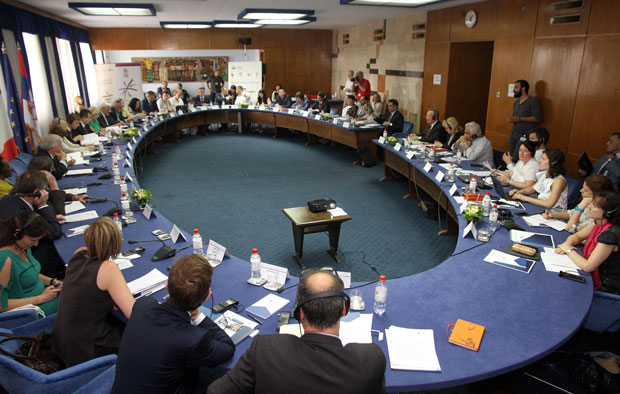Mental health of asylum-seekers in Serbia
Belgrade, 15 June 2015 - UN Refugee Agency (UNHCR) presented today the Study on Psychological Characteristics of Asylum-Seekers in Serbia.

The objectives of the research were to gain insight into the psychological wellbeing of the asylum-seekers in Serbia with a special focus on refugees from Syria, and to develop recommendations for work with this vulnerable group. UNHCR is grateful to psychologists Danka Purić, Maša Vukčević and Jelena Dobrić for the good work they have done.
Introducing the study, Anne-Birgitte Krum-Hansen, head of Protection Unit, UNHCR Serbia noted the unprecedented number of displaced people worldwide in 2015 - more than 59 million. Krum-Hansen informed that UNHCR had initiated the study on the mental health of asylum-seekers in view of constantly increasing number of persons in need of international protection from "refugee producing countries" notably Syria, Somalia and Afghanistan using the Western Balkan route on their way to seek protection in Western Europe. According to the data of the Ministry of Interior of the Republic of Serbia, the number of persons expressing intent to seek asylum in Serbia has risen from 5,066 in 2013, 16,490 in 2014 to 22,148 in the first five months of 2015 only. The study offers recommendations, like how to overcome language and cultural barriers, how to gain trust and express acceptance that we hope will be of use to all the practitioners in their daily contacts with refugees.
The interviews that served as basis for the research were conducted with 250 asylum-seekers using the globally recognized instruments that measure post-traumatic stress disorder, levels of anxiety and depression, and the instrument for assessment of traumatic events in transit and in Serbia. It was found that 89% of asylum-seekers in Serbia suffer from post-traumatic stress disorder, 67% from anxiety and 77% from depression as a consequence of their experience in the countries of origin and in transit.
As expected, the primary countries of origin of refugees were Syria, Somalia and Afghanistan, followed by Eritrea, Sudan and Iraq. In all, 56% of the respondents travelled alone and 87% have left members of families in their countries.
A special part of the research was focused on the incidence of trafficking in human beings (THB) among the asylum-seekers, their awareness about it and whether they know whom to contact in case of need. 71% of them said they knew what THB is, and 70% that they had experienced or heard of someone who had experienced it. However, 57% did not know whom to contact. According to the findings as many as 58% of asylum-seekers had been exposed to some form of THB.
The study gives a thorough insight into the sources of trauma of asylum-seekers in their countries of origin that they had to flee, as well as of experiences with smugglers, police and the local population in the countries they had to transit until reaching Serbia.
Publishing it in the run-up to the World Refugee Day, 20 June, UNHCR hopes that all those colleagues in Government and civil society as well as other who work with refugees in Serbia will be able to make good use of the findings and recommendations of this study.
UNHCR opened its office in Belgrade in 1976. Since 1992 the UN Refugee Agency has assisted Serbia's protection and integration of refugees, other displaced and stateless people with over 500 million Euros.



